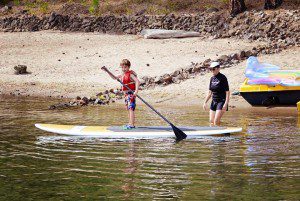
My family recently went on a vacation to Coeur D’Alene, Idaho. Coeur D’Alene is a city in northern Idaho that is not only impossible to spell, but it nestles upon against an impossibly beautiful lake where my aunt and uncle own a gorgeous home.
I had a great time playing in the water with my three children. We swam, rode a paddle boat, and played in the sand. All safe and fun activities that were perfect for my 7, 6, and 4 year old children.
But then my aunt did the unthinkable! As I was a hundred feet away relaxing on her dock, she hoisted my seven year old on her paddle board!
“No!” I thought to myself. “He’s not ready! He’s too young!”
I’d never been on a paddle board before. I’d only seen others stand on the surfboard-like structure as they paddle across a lake or river. When I lived in Chicago, I’d see people standing on them paddling on Lake Michigan. Some friends with experience paddle boarding told me that it takes a tremendous amount of balance and skill to stay afloat on a paddle board. And, well, I’m a klutz. So I assume my offspring are klutzes.
Hence, my fear.
I resisted the temptation to scold my aunt for her reckless behavior with my children, and it’s a good thing I did. They loved the paddle board! Apparently, the Ericksen klutz gene skips a generation. They each stood securely on the board and paddled with perfect rhythm to the lake’s beating waves.
Mimetic Theory, Un-Learning fear, and Learning Joy
Mimetic theory claims that we learn through imitation of our models. This seems obvious enough. It’s easy to see how my aunt taught my children how get on the paddle board, balance on it, and paddle their way on the lake. But they learned something much more important from my aunt about paddle boarding than the technique – they learned it was something to enjoy.
Now, if I had given into my trepidation and yelled across the dock, I would have taught my children that paddle boarding wasn’t something to enjoy; rather, it was something to fear.
But my aunt taught them that paddle boards were something to enjoy.
Parents spend much of our time fearing for our children. We worry that they aren’t ready yet and that they’ll get hurt. Not only do we hold them back, but we teach them that they should live in fear.
In fact, parents have a tendency to project our own fears and anxieties upon our children. Children learn how to fear the world and be anxious from us. But they can also learn how to enjoy the world from us.
Mimetic Theory and Faith
This is where faith comes in. Faith is not forcing our intellect to believe certain doctrines. Rather, faith is the ability to trust in someone else. For example, my aunt had faith that might children could ride the paddle board. My children absorbed her faith in them, and thus had faith in themselves that they could not only do it, but enjoy it.
When it comes to the faith of Jesus, Christians tend to emphasize his faith in the Father. Jesus trusted that the Father was pure, unadulterated, nonviolent, self-giving love. As their model, Jesus’ disciples learned from him that they had nothing to fear from God because God is perfect love and “perfect love casts out fear.”
The fact that we don’t have to fear God because of Jesus’ faith in God’s nonviolent love is important and life changing. But we tend to miss another aspect of Jesus’ faith that is just as important and life changing:
Jesus has faith in us.
Jesus’ faith in us is reckless and astonishing – some might even call his faith in us heretical. After all, Jesus said that his followers “will also do the works that I do and, in fact, do greater works than these, because I am going to the father.”
We will do greater works than Jesus? I must admit, I don’t know exactly what to make of that statement. To say that Jesus’ disciples will do greater works than saving the world from sin and death sound at least borderline heretical. But my experience at the lake gave me some insight.
Jesus’ faith that we would “do greater works than these” opens his disciples to a non-anxious, non-rivalrous, and non-fearful relationship with him. Even the best of teachers can fall into a rivalry with their students. There comes a point where a student becomes better than a teacher. The teacher, living in fear of being upstaged by the student, attempts to hold the student back with phrases like, “You aren’t ready! You are too young!”
But Jesus had no fear. His faith was in the Father, whose perfect love drives out fear and rivalry. He also had faith in us, we who frequently get faith and life and love wrong. And yet, there is Jesus, putting us back on the paddle board when we fall, constantly teaching us to unlearn fear and rivalry and to learn to have faith in him who has faith in us.











